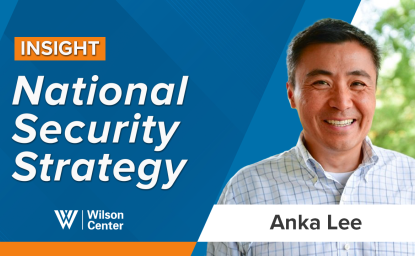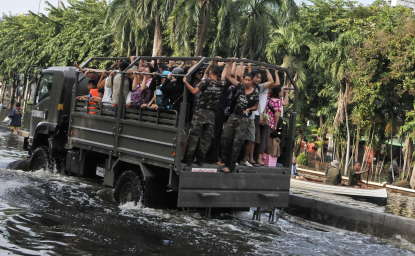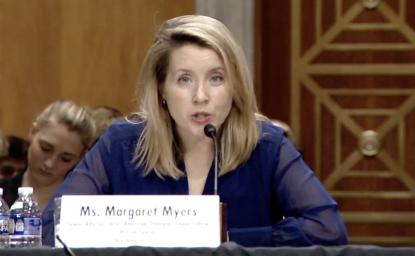By Amy McCreedy
In dealing with the new Indonesia, the United States and the rest of the international community face a series of tough but important questions: how much should we intervene to promote democracy and human rights? What kind of intervention is likely to be most effective? To what extent should the Indonesian government be criticized, pressured, or even punished for its failure to ensure individual protections?
These and related questions were addressed at a workshop hosted by the Asia Program on January 17, 2001. In general, all the panelists lamented the current situation in Indonesia, where public trust in the government is eroding and tension between Jakarta and separatist regions is growing fast. However, all expressed general support for President Abdurrahman "Gus Dur" Wahid, emphasizing that, for all its failures and foibles, the current administration in Indonesia is sincerely devoted to the principle of democracy, and that this point is important for outsiders to keep in mind.
Todung Mulya Lubis, a human rights lawyer and practitioner from Jakarta, began the discussion with the poignant observation that while the Indonesian people are ready for democracy, many of their elites are not. This, said Lubis, is the "irony of Indonesia."
Wahid may be guilty of erratic leadership, but—in contrast to many military leaders and politicians—he is at least genuinely committed to reform. Because of this, the proper course of action for the international community is to give "continuous support" to Wahid's government.
Democracy takes time. "I do share the disappointments that the international community may have. But I do not think it's fair to expect quick results." While Lubis acknowledged that current calls for Wahid's resignation are understandable and even (in many ways) justified, "We don't have an alternative at this time. We don't want to return to the past." Lubis went on to maintain that pushing the Indonesian government too hard could cause it to crumble, thereby opening the door for a military comeback. Instead of exerting pressure, the international community must help to strengthen what has already been accomplished as a means of safeguarding against violence.
Lubis gave credit to the Wahid administration for upholding civilian supremacy, fostering religious pluralism, strengthening the free press, and empowering civil society. The government has dissolved the Ministry of Social Affairs and loosened the Ministry of Information's control of the media. Meanwhile, Wahid has resisted using force to crush those who are calling for greater autonomy, insisting instead on negotiation. This sets him apart from previous Indonesian leaders.
Though not calling for Wahid's resignation, Lubis did not refrain from criticizing the president. In particular, he chastised the government for failing to uphold the rule of law, keep order, and control the military. According to Lubis, evidence is growing that military leaders were involved in the Christmas Eve bombings of 2000, which killed 19 people. Indonesia is a "paradise for the corrupt," and unemployment has grown to 30 million.
Meanwhile, the government wavers on granting autonomy to regions such as Aceh and W. Papua. Ambivalence in addressing the demands of these regions will only encourage Indonesia's dissolution. Meanwhile, secessionists are infuriated by delay in bringing human rights violators to justice. William Liddle of Ohio State University agreed that Wahid is genuinely dedicated to tolerance and pluralism, but maintained that the international community should not hesitate to "hold the government's feet to the fire." The right kind of pressure would be productive, not destructive, and would convince Wahid's administration to follow through on its commitments. According to Liddle, the problem is that "while the spirit is willing, the flesh is weak."
Liddle pointed out that the current government has made firm commitments to: 1) democracy, 2) national integrity, 3) religious pluralism, and 4) shared economic development. Progress has been made toward all of these goals, but problems of implementation are rife. For example, in spite of a democratic constitution, Indonesia suffers from a barely-functioning judiciary system and political parties that "raise funds any way they can."
In regard to national integrity, Wahid is to be commended for not using military force against the "rebels," as Suharto would have done. But state authority is so weak that Wahid's orders are not always implemented on the ground. Even in regard to religious pluralism—to which Wahid is obviously dedicated—the president cannot follow up on his promises. For example, his efforts to restrain the activities of Laskar Jihad, a militant Muslim militia group, were a failure.
In the area of economic development, Liddle maintained that there is some reluctance of the "spirit" as well of as the "flesh"—Wahid often seems to be "thrashing around, looking for a new formula" instead of enforcing market discipline. The government is guilty of distorting the market system by taking money from entrepreneurs and allowing corruption to flourish within the banking system.
In all these areas, pressure from the international community would encourage the Indonesian government to carry through with its professed aims and convert principles to reality. In practical terms, Liddle recommended that pressure be accompanied by technical assistance and training, in the form of "good governance" projects (such as those sponsored by the United States Agency for International Development) and democracy building workshops.
Sidney Jones of Human Rights Watch also criticized the Indonesian government to some degree. "We don't do anyone a favor by keeping quiet." She noted that many Indonesians themselves are distressed by human rights abuses—the United States, she argued, has a duty to support these indigenous voices. The George W. Bush administration must focus on human rights not just because they are important in themselves, but also because they are an indicator of the political and economic health of a country.
According to Jones, the foremost task in Indonesia is to strengthen civilian control of the military. The United States should help to train police, improve the transparency of the military's economic base, and provide the military with new economic opportunities. Most important, perpetrators of human rights abuses must be held responsible for their crimes. Criminal investigations, had they been prompt, might have prevented the pro-independence movement in Aceh—now all of Indonesia is paying the price.
In pushing for these ends, Jones indicated that the United States must "tread very carefully" in the area of Muslim-Christian relations. Looking at Indonesia, many members of the U.S. Congress tend to see Christians as beleaguered by militant Muslim fundamentalists, but in fact there have been outrages and victims on all sides. Jones advocated better sources of information, to prevent such misconceptions.
Other recommendations included supporting the Center for Humanitarian Dialogue (CHD), coordinating with other donor countries to help resolve the Aceh conflict, and improving education of the displaced population, which numbers more than 800,000. In general, Jones emphasized not so much supporting the current Indonesian leaders as strengthening the institutions around them.
Eric Bjornlund, Wilson Center fellow and former Asia director of the National Democratic Institute for International Affairs (NDI), served as commentator. Bjornland emphasized specific areas where the United States should push for change in Indonesia.
First, Indonesia must take a hard look at its constitution, which is vague on the legal relations between institutions and between the president and the legislature. Second, there must be real political opposition in the party system if it is to function adequately. Third, Bjornlund agreed with Sidney Jones on the urgency of establishing civilian control of the military. In order to accomplish these tasks, the United States must not limit its engagement to civil society, but must also work directly with political parties and not balk from dealing with the military.
Bjornlund agreed that the international community must sometimes pressure Indonesia's government—to "hold its feet to the fire" as advocated by William Liddle. But he emphasized that, in exerting such pressure, outsiders must seek to cooperate at all times with Indonesians who are genuine reformers. To undermine such reformers through too indiscriminate pressure is counterproductive.
As the international community tries to help Indonesia address its problems, the question of how to "do the right thing" has no easy answer. One first step implied by all four panelists is to recognize the scope and complexity of the problems facing this very young democracy, which is also the world's fourth largest country.
The general consensus of the workshop was that the worst thing the international community could do is to fail to hear the voices of those Indonesians who are truly ready for change. The second worst thing would be to give up too soon on what will prove to be a long, but exciting, process of democracy building from the ground up.

Indo-Pacific Program
The Indo-Pacific Program promotes policy debate and intellectual discussions on US interests in the Asia-Pacific as well as political, economic, security, and social issues relating to the world’s most populous and economically dynamic region. Read more

Explore More
Browse Insights & Analysis
Insights: Anka Lee – Asia & the U.S. National Security Strategy

Myanmar’s Junta and the 2026 Elections: A Fig Leaf for Legitimacy?

